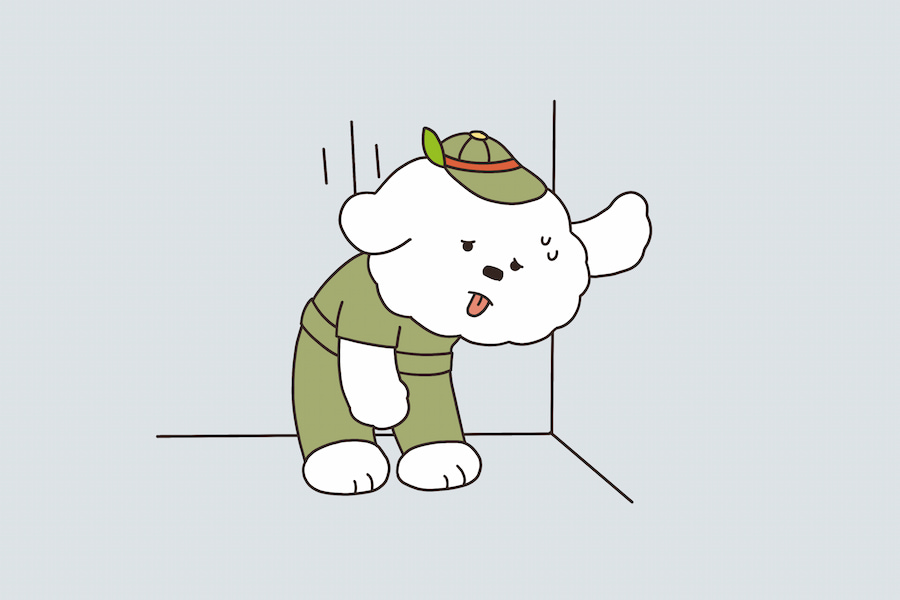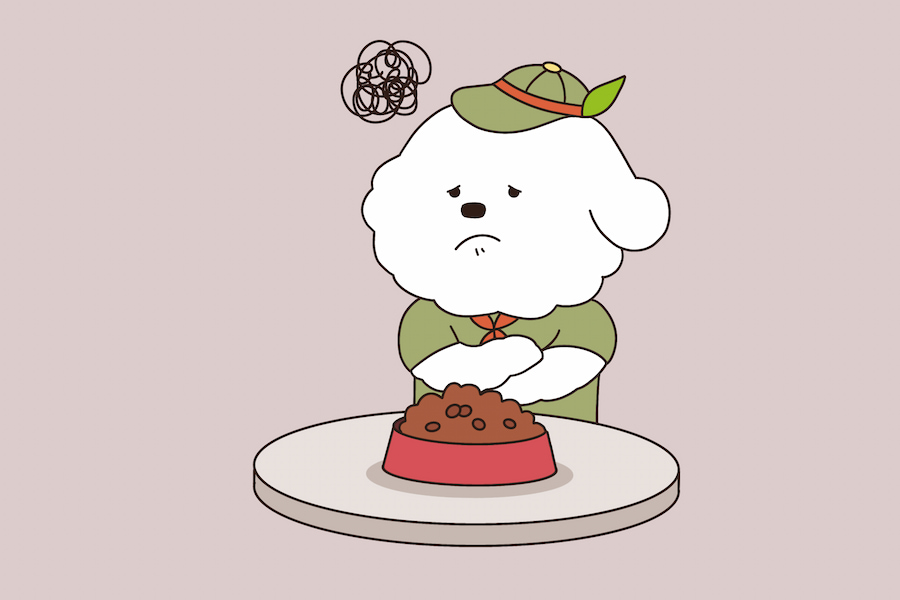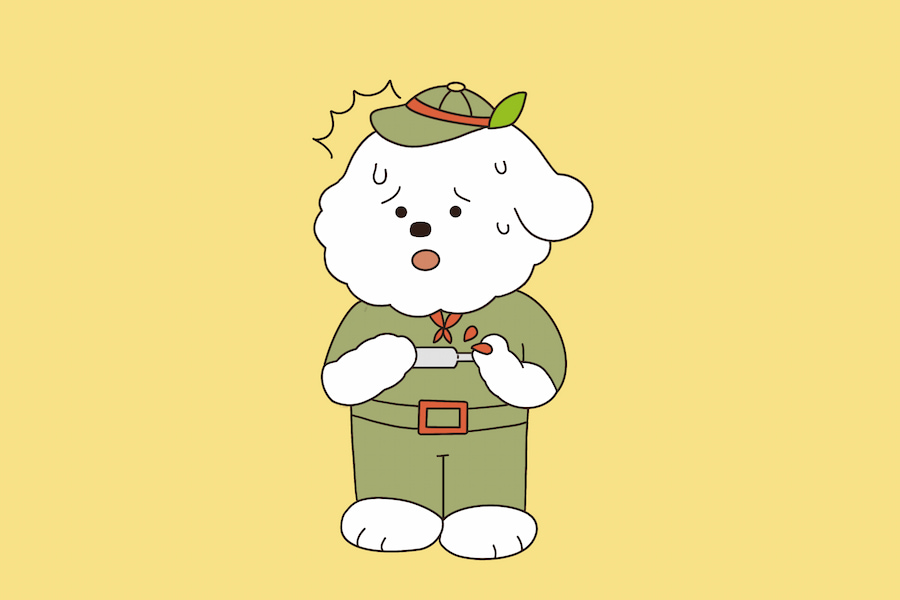Kidney disease in dogs occurs when the dog’s kidneys stop working efficiently. Kidney failure in dogs can be fatal if not addressed in a timely manner. There are two types of kidney disease in dogs: acute renal failure and chronic kidney disease. Signs of kidney disease include increased thirst and urination, anemia, pale gums, lethargy, loss of appetite, vomiting, diarrhea, and more.
Kidney failure is irreversible; therefore, you must understand the causes, signs, and symptoms of dog kidney disease to prevent renal failure at an early stage. Let’s understand the types, causes, symptoms, diagnosis, treatment, prevention, and dietary requirements for canine kidney disease.

Lee&Pol offers dog treats made with omega-3-rich dried pollock, which is great for kidney health. We also carefully remove salt and bones over 24 hours!
What are the Kidneys’ Functions?
Kidneys are important organs that perform various vital functions. They are responsible for removing waste products or toxins from the blood and producing urine. They are also responsible for producing a hormone called erythropoietin that stimulates the bone marrow to produce red blood cells.
Kidneys also reserve water in the body to keep it hydrated and maintain the levels of essential minerals such as Potassium and sodium. They also play a role in controlling blood pressure.
Kidney Disease in Dogs
There are two types of kidney problems in dogs. One is chronic kidney disease, which occurs mainly because of the aging and degeneration of the functional units of the kidneys. The second type is acute renal disease that results from trauma, toxin ingestion, or infections.
Chronic kidney disease is not preventable, but it can be delayed if diagnosed earlier, and dogs’ lifespans can be increased from months to years. On the other hand, acute renal failure is completely curable if addressed intensively and timely.

But sometimes, acute renal injury can convert into chronic kidney disease after months or years.
Dog Kidney Disease Symptoms
Let’s have a look at the signs and symptoms of chronic kidney disease as well as acute renal failure:
Chronic Kidney Disease Symptoms
Symptoms of kidney disease in dogs that is chronic, which means it develops slowly for months to years, include:
- Increased urination (Known as Polyuria)
- Increased thirst (Known as Polydipsia)
- Lethargy and dullness
- Vomiting
- Diarrhea
- Loss of appetite
- Bad breath
- Mouth ulcers
- Weight Loss
- Brittle bones
Acute Renal Failure Symptoms
Signs of kidney failure in dogs that is acute, which means its onset is sudden, include:
- Discoordination
- Lethargy
- Vomiting
- Weakness
- Increased or decreased thirst
- Increased or decreased urination
- Loss of vision if the failure is severe

Kidney Failure in Dogs Stages
According to the IRIS (International Renal Interest Society), there are 4 stages of kidney issues in canines. These stages are mentioned as stages 1-4, with 4 being the severe kidney failure stage. Early stages of kidney disease in dogs like stage one and two are mild and dog owners may not notice the clinical signs of kidney disease during these stages. It’s stage three where the symptoms of kidney disease become evident, and they get worse at stage four.
Causes of Kidney Disease in Dogs
Causes of kidney disease vary depending on the type of kidney disease. Let’s discuss the causes of chronic kidney disease in dogs and acute renal injury.
Causes of Chronic Kidney Disease (CKD)
The causes of CKD are discussed below:
Geriatric Degeneration OR Aging
One of the main causes of chronic renal failure in dogs is aging. When the dogs get old, their body cells start to die, including the functional cells of the kidneys. This process is called geriatric degeneration. This is the reason behind improper kidney function in senior dogs.

We cannot stop this natural wearing-out process, but we can slow it down with different techniques if we catch it early.
Dental Issues
Another cause of chronic kidney disease in dogs is genetic factors. Due to genetics, some dogs may be born with kidney function issues or kidney diseases, which can lead to chronic kidney disease.

Breeds that are genetically at higher risk for kidney disease include Golden Retrievers, Siberian Huskies, Miniature Poodles, and Welsh Corgis.
Congenital Abnormalities
Congenital disabilities like agenesis (being born without one or both kidneys) can also be a reason for renal failure in dogs. Conditions like these result in abnormal kidney function and disable kidneys from properly removing toxins and waste materials from the blood.
Causes of Acute Renal Failure in Dogs
Acute or sudden dog kidney failure can result due to:
- Accidental trauma
- Toxic plants like lilies
- Toxic food like chocolate, grapes, or raisins
- Severe dehydration
- Heat stroke
- Blockage of the urinary tract (Due to stones)
- Ingestion of antifreeze (Ethylene Glycol)
- Household cleaners
- Medications like ibuprofen or naproxen
- Bacterial infection (leptospirosis)
- Snake bites
- Congestive heart failure
- Lyme disease
- Glomerulonephritis
- Cancer
Diagnosis of Kidney Failure in Dogs
Veterinarian use urinalysis and a blood biochemistry profile to diagnose kidney failure in dogs. First, check the urine specific gravity (USpG); if it’s low, it indicates kidney problems. Second, check the blood biochemistry report to check the blood urea nitrogen (BUN) and blood creatinine (CREA) values. These values can be the perfect indicator for confirming decreased kidney function in dogs.
Blood levels of sodium, Potassium, phosphorus, and calcium should also be considered for a definitive diagnosis of dog kidney failure. The red and white blood cell counts are also important for the final decision.
SDMA (a natural marker for kidney functioning) can be used to check early renal failure. SDMA is more effective than creatinine in terms of catching dog kidney disease earlier.

SDMA values increase above normal when at least 25% of the kidney function is impaired, while creatinine increases in the blood when 75% of the kidney function is impaired.
Treatment for Kidney Disease in Dogs
Acute renal failure treatment usually involves hospitalization, intensive fluid administration to help the kidneys remove excessive toxins, medications to help with symptoms, antibiotics, and toxin-binding medications. Kidney dialysis may be recommended in severe cases but is only available at a few specialist clinics.
On the other hand, the goal of treating chronic kidney disease in dogs is to preserve kidney function, slow down the progression of CKD, and help with symptoms. Chronic kidney disease is progressive, so dog owners must visit the vet clinic regularly for blood tests and other examinations to adjust the treatment accordingly.
Treatment for your dog’s chronic kidney failure will depend on the overall health and laboratory reports. Your veterinarian will do CKD treatment that may include some or all of the below options:
Specialized Diet
Dogs with chronic kidney failure need a specialized diet low in protein, phosphorus, and sodium and high in omega-3 fatty acids.
Protein is restricted in kidney failure to decrease the production of waste products because of protein metabolism. Lower production of these nitrogenous waste products decreases the kidney load and ultimately preserves kidney function.
A protein-restricted diet also helps reduce or eliminate other symptoms of dog kidney failure, such as lethargy, ulcers, bad breath, anorexia, vomiting, and diarrhea. These clinical signs are caused by protein waste products. Low dietary protein decreases the production of these waste products and ultimately helps with these symptoms.
Dietary protein restriction may also help with increased thirst (Polydipsia) and increased urine (Polyuria) and reduce anemia in dogs. Protein waste products contribute to anemia because they are believed to reduce the lifespan of red blood cells.
A diet high in omega-3 fatty acids helps kidneys by reducing the production of the inflammatory compounds that cause oxidative stress to the kidneys. This will result in slower progression of chronic kidney disease in dogs.

Lee&Pol’s dried pollock is packed with omega-3 fatty acids, which are beneficial for dogs with kidney disease, and we’ve significantly reduced sodium through 24-hour desalting process!
Minerals Alterations
Altering mineral intake is important for preserving kidney function and eliminating kidney failure symptoms. The important minerals to consider are phosphorus, sodium, and Potassium.
When kidneys fail to function properly, they cannot remove phosphorous from the body, which results in elevated phosphorus levels in the body. Increased phosphorus levels disturb the levels of calcium and cause vitamin D deficiency. To cope with this, we need to reduce the dietary phosphorus. In the extreme stages of kidney failure, restricting the dietary phosphorous alone is not helpful and your vet may need to use phosphate binders like aluminum hydroxide and lanthanum that bind with phosphates in the intestinal tract and don’t allow them to get absorbed into the blood.
Reducing sodium intake is beneficial for patients with kidney failure. Dogs with kidney failure experience high blood pressure, so we need to reduce the intake of sodium, which eventually helps maintain blood pressure.

Additionally, reduced sodium also decreases the workload on the kidneys.
Lastly, Potassium may increase, although most dogs experience a decrease. This happens due to low food intake and increased potassium loss through urine in patients with kidney failure. Potassium also needs to be adjusted as per the blood test reports.
Fluid Therapy
Intravenous (IV) or subcutaneous fluid administration is common for kidney failure patients. This helps maintain the electrolyte balance, especially Potassium, addresses dehydration, and helps kidneys remove waste products.
When first diagnosed, kidney failure patients may undergo a flushing process with IV fluid administration. This flushing process is called diuresis and may result in complete recovery of kidney function if enough kidney cells are alive.

It works by removing excess toxins and providing a healthier environment for kidney healing.
Synthetic Erythropoietin to Normalize RBC Production
When kidneys are normal, they produce a hormone called erythropoietin, which stimulates the bone marrow to produce red blood cells. In kidney failure, the kidneys don’t produce this hormone, so many dogs experience anemia or low red blood cell count.
Parathyroid Gland and Calcium Regulation
When phosphorus levels increase in the blood because of kidney failure, the parathyroid gland removes the calcium from the bones to keep the calcium phosphorous levels at a normal 2:1. But this can make bones very brittle. If your veterinarian finds any evidence of parathyroid gland abnormality, they may advise you to use calcitriol to improve the calcium absorption from the gastrointestinal tract.
Proteinuria Treatment
Increased protein levels in the urine can be cured by using angiotensin-converting enzyme inhibitors (blood pressure medications like benazepril). These medications help decrease pressure in the kidneys, eventually decreasing proteinuria.
Appetite Stimulator
In the late stages of kidney disease in dogs, dogs refuse to eat. In this case, an FDA-approved medication, Capromorelin, can be used as an appetite stimulator.
Vitamin Supplementation
Increased urination results in loss of water-soluble vitamins, including vitamin C and B vitamins. This results in less appetite in dogs. Diets for kidney failure dogs must be supplemented with these vitamins.
Kidney Dialysis and Transplantation
In rare cases, kidney dialysis and kidney transplants can be performed in dogs with renal failure. However, kidney dialysis is expensive and only available at a few universities and specialist veterinary clinics.
Best Diet for Dogs with Kidney Disease
The best diet for dogs with kidney insufficiency should be:
- Low in protein
- Low in Phosphorous and Sodium
- Include phosphate binder for specific cases
- High in Omega 3 fatty acids that can be obtained from dried pollack
- High in Potassium in some cases
- High in Vitamin C and B vitamins
- High in Fat

Lee&Pol’s dried pollock is low in fat and rich in omega-3 fatty acids. Plus, it’s a salt-free, making it an even better choice!
Dangerous Foods for Dogs with Kidney Disease
Here are the foods that cause kidney failure in dogs:
- High protein food
- Salty Foods
- Chocolate
- Grapes
- Raisins
- Alcohol
- Macadamia
- Coconut
- Milk
- Xylitol
- Onions and garlic
- Coffee and caffeine
Prevention of Dog Kidney Disease
The following things can help you prevent kidney failure in dogs:
Routine Wellness Exams
Routine wellness exams and lab tests are important to detect chronic kidney problem at an early stage. The earlier you detect kidney disease in dogs, the better the prognosis. Nowadays, SDMA, a new biomarker for normal kidney functioning, can tell us about kidney disease at a much earlier stage than traditional blood and urine tests.
Avoid Exposure to Toxins
If your dog ingests anything toxic that can cause acute renal injury, such as Lilly flowers, household cleaners, antifreeze, chocolate, grapes, or raisins, contact your vet immediately to avoid harm to the kidneys.
Keep hazardous chemicals away from the reach of your dog.

You should know that dogs are chewers, so they can chew and ingest these chemicals if they’re in plastic bottles. So, you must keep them high enough that your dog can’t reach them.
Avoid Exposure to Medications
Some human medications, like ibuprofen, are extremely harmful to dogs’ kidneys. You should keep medications like these away from your pet’s reach.
Vaccination
Some bacterial infections, like leptospirosis, can cause kidney disease in dogs. Therefore, you should keep your dog vaccinated.
Conclusion
Acute kidney injury can be treated if addressed in a timely manner. A restricted diet and fluid therapy can slow down the progression of chronic kidney disease. Symptoms of kidney disease can be managed by altering minerals and administering the necessary medications. Always consult your vet immediately if your dog ingests anything toxic to avoid harm to the kidneys.
Routine wellness exams, proper dental hygiene, up-to-date vaccinations, and avoiding exposure to toxins can easily prevent or delay kidney disease in dogs.
FAQ
Toxins responsible for kidney failure in dogs include Lilly flowers, antifreeze, household cleaners, toxic medications like ibuprofen or naproxen, and toxic foods like chocolate, grapes, or raisins.
Sudden onset of dog kidney failure can occur due to trauma, severe dehydration, heat stroke, urinary tract stones, antifreeze, household cleaners, toxic plants like lilies, toxic food like chocolate, grapes, or raisins, medications like ibuprofen or naproxen, and diseases including leptospirosis and Lyme disease.



